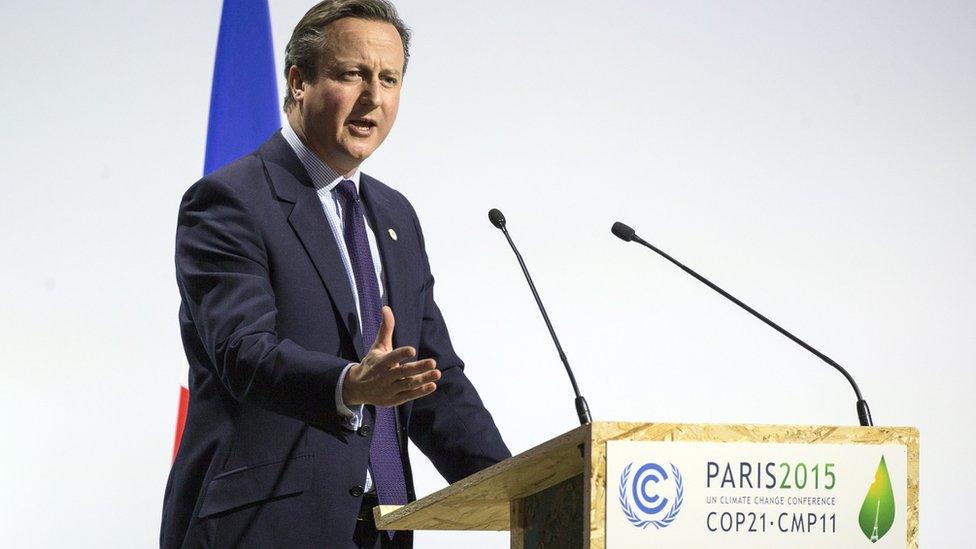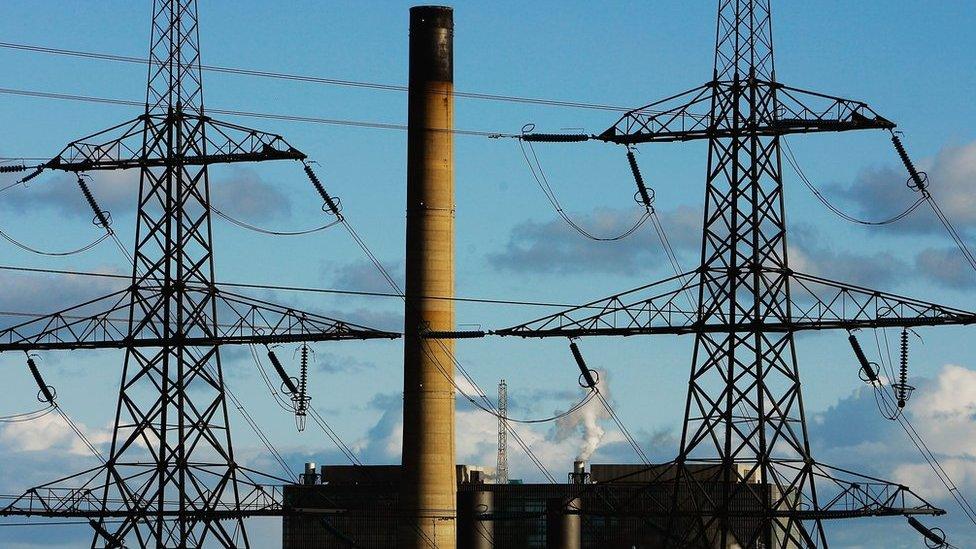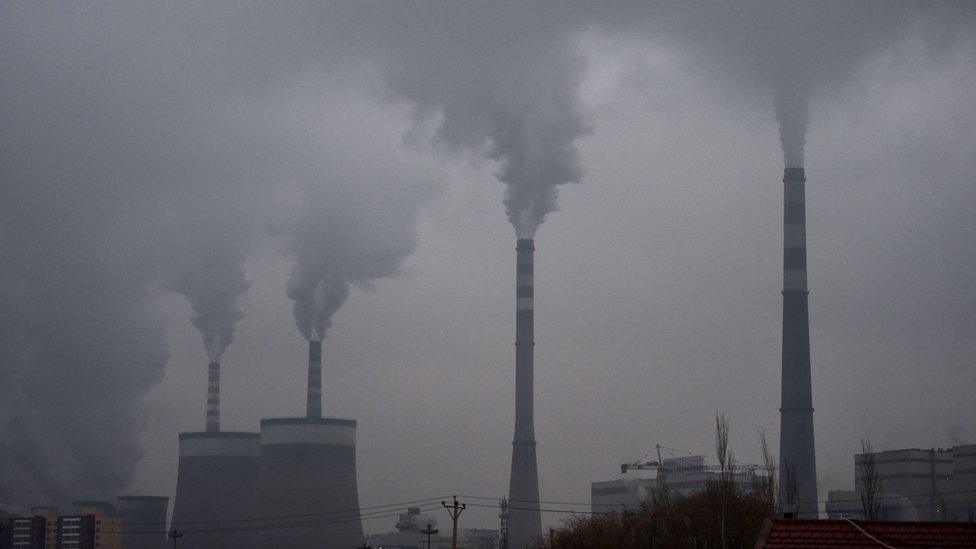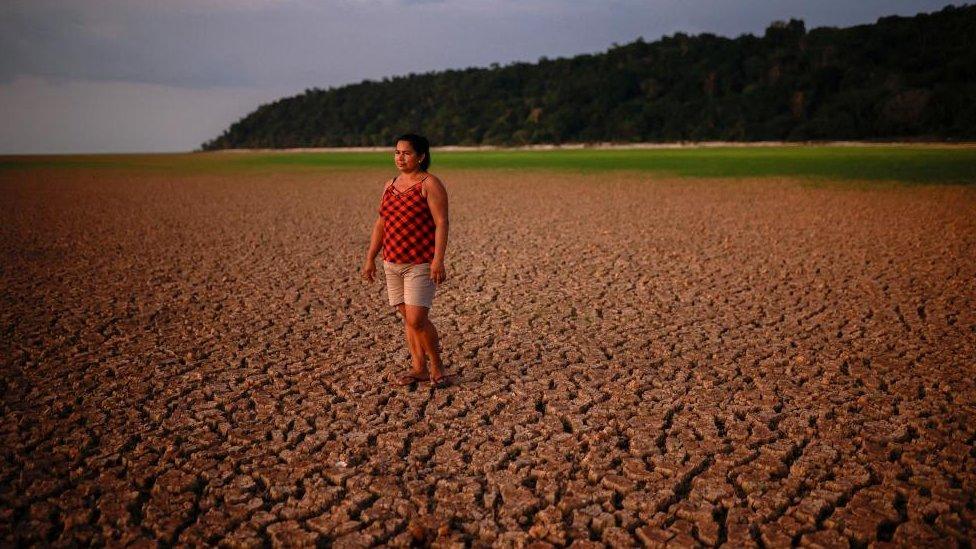David Cameron challenged on climate policies
- Published

The PM has been accused of double standards over climate change, ahead of a Commons committee appearance.
Select committee chairmen Huw Irranca-Davies (Labour) and Angus MacNeil (SNP) said he has scrapped UK schemes aimed at cutting emissions, despite pledging internationally to protect the climate.
They singled out the decision to axe a carbon capture and storage (CCS) project promised in the Tory manifesto.
The government said the CCS scheme had always been "subject to affordability".
David Cameron is due before the Commons Liaison Committee, external later, which is made up of MPs who chair Commons select committees.
He will be questioned on climate change, as well as the conflict in Syria.
'Holy Grail'
Mr Cameron had said CCS was "absolutely crucial" for the UK, so the decision to scrap a £1bn competition for a large-scale trial CCS plant is being criticised by the MPs.
CCS is the "Holy Grail" of the fossil fuel industry.
If it can be made to work economically at industrial scale, it will capture the emissions from power stations that heat the climate, and bury them deep underground.
That would allow coal and gas to be burned in the low-carbon future deemed essential by all governments at the climate summit in Paris.
Mr MacNeil, who chairs the energy and climate change committee, told BBC News the decision to scrap the CCS fund was incomprehensible.
He said: "The prime minister said that carbon capture and storage was crucial to meet our climate change targets.
'Growing gulf'
"Yet the government's long-promised carbon capture competition has become the latest low-carbon policy to be chucked on the scrapheap by the government."
Mr MacNeil said "sudden changes" to energy policy were undermining investor confidence in the energy sector.
He added: "The prime minister must acknowledge that building a new generation of gas plants means that we either have to fit power stations with carbon capture technology in the coming decade or potentially bust our carbon budgets."
Mr Irranca-Davies, chairman of the environmental audit committee, added: "We're hearing a growing gulf between the prime minister's bold talk about climate change on the international stage and the short-termism and incoherence of decisions on energy and sustainability at home."
On another issue, Conservative Neil Parish, who chairs the environment, food and rural affairs committee, warned that flood relief would have to be a "much bigger priority" for the government if flooding becomes "the new normal".
Difficult decisions
In an appearance before the liaison committee in December 2014,, external Mr Cameron said carbon capture and storage was "absolutely crucial if we are going to decarbonise effectively".
He said more needed to be known about CCS before committing to it, which is why the government committed £1bn for the trial.
Energy industry leaders were astonished when the fund was scrapped without explanation following November's Autumn Statement.

BP abandoned plans for a carbon capture plant at Peterhead in 2007
The Department for Energy and Climate Change told the BBC: "The government was clear that this was subject to affordability.
"The Spending Review was a tight financial settlement and difficult decisions have had to be made. CCS (still) has a potential role in the long-term decarbonisation of the UK."
The decision to scrap the CCS trial was applauded by Nigel Lawson's pressure group, the Global Warming Policy Forum.
'No need'
Its spokesman Benny Peiser told the BBC: "Worldwide, there are currently more than 20 pilot projects being funded.
"Let's wait and see whether the controversial technology will ever be viable at large scale. If so, Britain could simply buy it off the shelf if need be."
But Professor Dieter Helm, from Oxford University, a supporter of many of the government's other energy reforms, said: "It's a no-brainer that the shallow North Sea is the place to try out CCS, with lots of empty holes, pipelines, experience and gas plants nearby.
"So the question is really whether the UK cares about the climate change problem or is merely trying to achieve its carbon production targets at minimum cost."
Follow Roger on Twitter @rharrabin, external or on Facebook www.facebook.com/roger.harrabin
- Published29 November 2015


